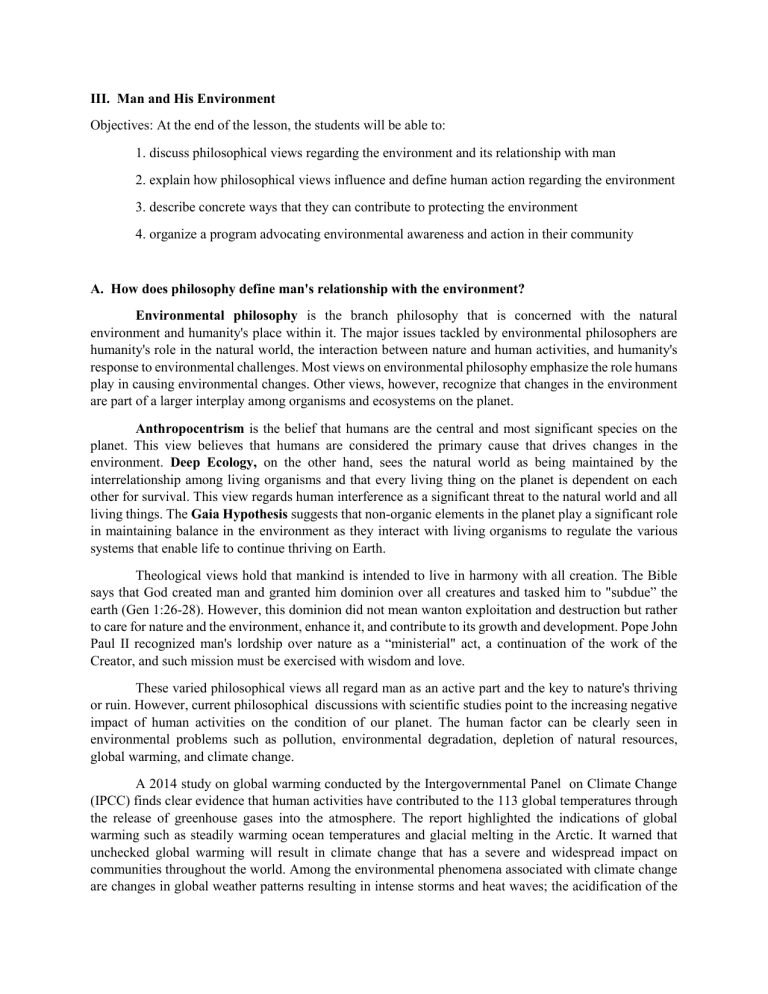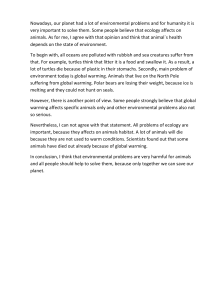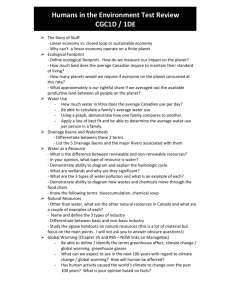
III. Man and His Environment Objectives: At the end of the lesson, the students will be able to: 1. discuss philosophical views regarding the environment and its relationship with man 2. explain how philosophical views influence and define human action regarding the environment 3. describe concrete ways that they can contribute to protecting the environment 4. organize a program advocating environmental awareness and action in their community A. How does philosophy define man's relationship with the environment? Environmental philosophy is the branch philosophy that is concerned with the natural environment and humanity's place within it. The major issues tackled by environmental philosophers are humanity's role in the natural world, the interaction between nature and human activities, and humanity's response to environmental challenges. Most views on environmental philosophy emphasize the role humans play in causing environmental changes. Other views, however, recognize that changes in the environment are part of a larger interplay among organisms and ecosystems on the planet. Anthropocentrism is the belief that humans are the central and most significant species on the planet. This view believes that humans are considered the primary cause that drives changes in the environment. Deep Ecology, on the other hand, sees the natural world as being maintained by the interrelationship among living organisms and that every living thing on the planet is dependent on each other for survival. This view regards human interference as a significant threat to the natural world and all living things. The Gaia Hypothesis suggests that non-organic elements in the planet play a significant role in maintaining balance in the environment as they interact with living organisms to regulate the various systems that enable life to continue thriving on Earth. Theological views hold that mankind is intended to live in harmony with all creation. The Bible says that God created man and granted him dominion over all creatures and tasked him to "subdue” the earth (Gen 1:26-28). However, this dominion did not mean wanton exploitation and destruction but rather to care for nature and the environment, enhance it, and contribute to its growth and development. Pope John Paul II recognized man's lordship over nature as a “ministerial" act, a continuation of the work of the Creator, and such mission must be exercised with wisdom and love. These varied philosophical views all regard man as an active part and the key to nature's thriving or ruin. However, current philosophical discussions with scientific studies point to the increasing negative impact of human activities on the condition of our planet. The human factor can be clearly seen in environmental problems such as pollution, environmental degradation, depletion of natural resources, global warming, and climate change. A 2014 study on global warming conducted by the Intergovernmental Panel on Climate Change (IPCC) finds clear evidence that human activities have contributed to the 113 global temperatures through the release of greenhouse gases into the atmosphere. The report highlighted the indications of global warming such as steadily warming ocean temperatures and glacial melting in the Arctic. It warned that unchecked global warming will result in climate change that has a severe and widespread impact on communities throughout the world. Among the environmental phenomena associated with climate change are changes in global weather patterns resulting in intense storms and heat waves; the acidification of the oceans that affects countless marine life; and increased global sea levels. In the face of the realities of climate change. policymakers have sought insights from philosophers in the development of programs that will effectively deal with the degradation of the environment. B. How do philosophical views influence environmental action? The growing concern for the environment and the evidence of the impact of human activities on nature has led philosophers to advocate for the application of ethical concepts to environmental concerns. Environmental ethics emerged in the 1970s and advocated human responsibility and action with regard to environmental issues. This ethical view emphasizes key ideas that combine philosophical, pragmatic, and theological perspectives. First, all nonhuman elements of the world, including animals and natural resources, have intrinsic have intrinsic value and should be preserved. Second, the preservation of the environment is beneficial for humans, as it will continue to provide for the present and future generations. Finally, man has a responsibility to safeguard the planet as it has been entrusted to him by God. Environmental ethics has resulted in the development of varied news. Social ecology applies an ecological and ethical approach in analyzing society, and sees a relationship between social problems and environmental problems. Society should, therefore, implement changes in order to address issues regarding the environment. The growing concern with climate change has inspired a number of views and concepts such as climate ethics and climate justice, which consider climate change a significant ethical, social, and political issue. These views were greatly influenced by the concept of environmental justice, which refers to the fair distribution environmental benefits, as well as the burden of meeting environmental challenges. Advocates of environmental justice emphasize equity and the meaningful involvement of communities and governments in addressing environmental challenges, and in planning and implementing environmental policies. Another important development in environmental awareness is environmental aesthetics. This perspective originally discussed concepts of beauty in nature but has recently been increasingly influenced by environmental concerns. Beginning in the 20th century, environmental aesthetics began to discuss natural beauty in the context of maintaining order and balance in the environment. For its adherents, knowledge about nature will not only enable man to appreciate nature's innate beauty but will also help him relate more effectively with the environment. Significant social movements that were inspired by increased environmental awareness include the environmental protection and conservation movement, animal rights, and green politics. Activism and increased organized action are indications of the growing awareness of environmentalism in today's society. Environmentalism has also become an important issue in international politics as governments and international organizations have devoted efforts to discuss environmental issues and formulate plans to address them. Significant developments include the signing of the Kyoto Protocol in 1997, where various nations committed to reduce their greenhouse gas emissions in order to curb global warming. The celebration of Earth Day. first instituted in 1970, is a global effort to raise awareness of environmental issues and inspire action among communities.






